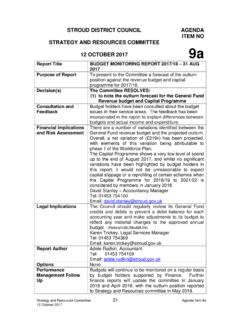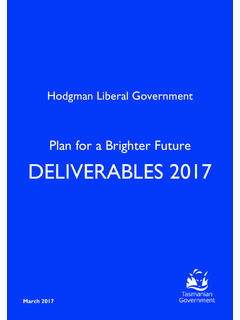Transcription of Taxing gains made by non-residents on UK …
1 Taxing gains made by non-residents on UK. immovable property Consultation document Publication date: 22 November 2017 . Closing date for comments: 16 February 2018. This Consultation Document should be read alongside the Technical Note on the related anti-forestalling rule coming into effect from budget Day, 22 November 2017 . 1. Subject of this The tax treatment of gains accruing on disposals of interests in UK. consultation: immovable property by non-residents . This document also explains that an anti-forestalling rule will come into effect from 22 November 2017 . There is a separate Technical Note available on this subject. Scope of this This consultation describes the government's proposals for the intended consultation: scope of new rules to charge non-residents to tax on gains realised from disposal of interests in UK property; and invites comments and feedback on particular issues and impacts of the policy as described.
2 This consultation also looks at the future of the rules applying to ATED- related gains , which will predominantly affect non-residents . Who should The government welcomes comments from anyone involved in UK. read this: property ownership, advisers, and representative bodies. Duration: This consultation runs for 12 weeks from 22 November 2017 to 16. February 2018. Lead official: James Konya, HM Revenue and Customs How to respond Responses, request for hard copies, and general queries about the or enquire content or scope of consultation can be sent by email to about this consultation: or by post to: NRCG Consultation, HM Revenue & Customs, Room 3C/04, 100 Parliament Street, London, SW1A 2BQ. For queries over the phone, please call 03000 544 525.
3 Additional ways HMRC will be happy to hold or attend meetings with interested parties to be involved: to discuss these proposals. After the The government will publish its response, along with draft clauses, in consultation: late summer 2018. Legislation will be introduced in the 2018 to 2019. Finance Bill and will take effect from April 2019. Getting to This is a new consultation. this stage: Previous This is a new engagement with stakeholders on this subject. engagement: On request this document can be produced in Welsh and alternate formats including large print, audio and Braille formats 2. Contents Chapter Content Page 1 Introduction 4. 2 Scope of the measure 7. 3 Direct disposals 9. 4 Indirect disposals 11. 5 Disposals of residential property 17.
4 6 Collective investment vehicles 19. 7 Reporting and compliance 22. 8 Summary of consultation questions 25. 9 The consultation process: how to respond 27. Table of impacts 29. Annex A Relevant current UK legislation 31. 3. Introduction Background The government announced at autumn budget 2017 that from April 2019 tax will be charged on gains made by non-residents on disposals of all types of UK. immovable property, extending existing rules that apply only to residential property. Land is a national resource. Consistent with this, international tax rules give the primary Taxing rights over income and gains to the state in which land and other immoveable property is located. Unlike most other major jurisdictions, the UK does not currently exercise its full Taxing rights where non-residents dispose of non-residential property such as offices, factories, warehouses, shops, hotels, leisure facilities, and agricultural land located in the UK.
5 This puts non-residents at an advantage over UK. residents. It also drives the creation of complex offshore structures to hold property, which can facilitate avoidance. The UK also does not currently tax widely-held1, non-resident companies on disposals of interests in residential land, nor exert its right under international agreements to tax disposals of entities that derive their value predominantly from UK land. Changes to address this are detailed in this document. These changes will more closely align the tax treatment of non-UK resident owners of UK immovable property with that of UK residents, and reduce the incentive for multinational groups to hold UK property through offshore structures, often in low tax or no tax jurisdictions.
6 The proposals represent a significant change to the rules for Taxing chargeable gains on immovable property. Whilst some aspects of the reforms are fixed, such as who is in scope, commencement date, and core features of the direct and indirect disposal provisions, the government is keen to consult to ensure that the legislation is effectively targeted and does not place unnecessary burdens on affected taxpayers. Overview The measure will expand the tax base of both the corporation tax and capital gains tax regimes. With some exceptions as explained in this document, the intention is that the usual rules for those regimes will be followed for the assets brought into scope. The rules will create a single regime for disposals of interests in both residential and non-residential property (also called commercial property' in this document), introducing a new charge for gains on disposals of commercial property and extending the rules for residential property to indirect sales and disposals made by widely-held companies.
7 1A widely-held company is one that is not close. Broadly, a close company is one where five or fewer of the participators control the company, or participators who are directors control the company. 4. Indirect disposal rules will apply where an entity is property rich', which is broadly where 75% or more of its gross asset value at disposal is represented by UK immovable property, as described in Chapter 4. Such disposals will trigger the charge only where the person holds, or has held at some point within the five years prior to the disposal, a 25% or greater interest in the entity. For indirect disposals there will be a reporting requirement on certain third-party advisors who have sufficient knowledge of the transaction. Existing rules for non-residents and immovable property There are currently two capital gains regimes applying to non-residents specifically in respect of UK immovable property: capital gains tax on ATED- related2 gains , and Non-Resident Capital gains Tax (NRCGT).
8 Both of these apply to residential property, and both are in the capital gains tax rather than corporation tax regime. Neither applies to indirect transactions in property. In March 2017 the government published a consultation on Non-resident companies chargeable to Income Tax and Non-Resident CGT'3, which amongst other issues sought views on bringing closely-held companies that are liable to NRCGT into Corporation Tax. The government's responses to that consultation will be published shortly after autumn budget , and is consistent with the changes outlined in this document. The government also sees the changes outlined in this document as an opportunity to rationalise the existing regimes into a unified approach to Taxing non-residents ' gains on disposals of interests in UK immovable property.
9 It will be necessary to retain some of the distinctions regarding the treatment of residential and non-residential property, but as far as possible the aim is to create a cohesive framework. There was strong feedback to the March 2017 consultation that the regime for ATED-related gains is extremely complex. Given the expansion of the rules to cover all non-resident companies and indirect disposals, the government wishes to explore the case for harmonising ATED-related gains with the wider regime as proposed in this consultation. An overview of the existing rules is in Annex A to this document. Content of this document Chapter 2 describes the scope of the measure in terms of chargeable assets and persons. Chapter 3 outlines how the new charge on direct disposals of interests in non- residential property by non-residents will operate.
10 Chapter 4 describes in detail how the new charge on indirect disposals of property rich entities will operate. 2 Annual Tax on Enveloped Dwellings - an annual tax payable mainly by companies that own UK. residential property valued at more than 500,000. 3 The consultation can be found on at resident-companies-chargeable-to-income- tax-and-non-resident-capital- gains -tax 5. Chapter 5 describes how this measure expands the scope of the rules relating to disposals of interests in residential property, and raises questions about harmonising ATED-related CGT. Chapters 6 highlights some specific aspects of investment through funds, and invites input on what special treatment might be needed. Chapter 7 sets out some of the administrative framework within which the new rules will operate.











